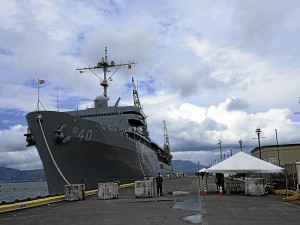US looking forward to successful base access talks with PH

The USS Frank Cable, a submarine tender, docked in the Alava Pier of the Subic Bay Freeport . Photo by Robert Gonzaga
MANILA, Philippines — The United States is confident about the positive conclusion of its base access talks with the Philippines, reiterating its support for the country’s defense buildup and preparedness for disaster response.
In a statement on Tuesday, US Embassy officials expressed hopes that negotiations, set to begin on Tuesday, in Manila, would reinforce the long-standing partnership between the two allies as both keenly pursued a common bid for a more stable Asia-Pacific region.
“We support the Philippine Government in its desire to build a credible defense and respond rapidly during times of humanitarian crisis and natural disasters,” said US Embassy officials in a statement sent to the Philippine Daily Inquirer.
“We are optimistic that the first round of negotiations will result in positive outcomes that will further strengthen our 62-year alliance,” officials said.
Foreign Affairs Secretary Albert del Rosario and Defense Secretary Voltaire Gazmin on Monday announced the formal start of negotiations between the Philippines and the US on the latter’s expanded access to Philippine military bases, a move that has invited criticism from those long opposed to US military presence here.
Article continues after this advertisementDel Rosario earlier said the talks would include discussions on “modalities and parameters” within which US troops would be allowed greater rotational presence in the Philippines under existing bilateral agreements and in compliance with Philippine law, particularly the Constitution.
Article continues after this advertisementThe Department of Foreign Affairs (DFA) reiterated this on Tuesday and said the bounds of the agreement had already been defined in deference to Philippine law.
“The parameters have already been set and both secretaries (Del Rosario and Gazmin) have already stated this yesterday (Monday). These are very clear parameters — respect for Philippine Constitution, the laws and jurisprudence, the preservation of Philippine sovereignty, the non-permanence of US troops and non-exclusivity of use of facilities by US side and the mutuality of benefits,” Foreign Affairs Assistant Secretary Raul Hernandez, the DFA spokesman, said.
He also addressed criticism thrown at Del Rosario for leading the effort, particularly remarks of Senator Antonio Trillanes IV, saying the official was “drawing attention to himself” in making announcements on the Philippine-US negotiations.
Del Rosario and Trillanes were at opposite ends in 2012, when the top diplomat said the senator’s backchannel effort to settle the territorial dispute with Beijing was “doing more harm than good.”
Trillanes, who has long showed displeasure over Del Rosario’s stay at the DFA, meanwhile accused the official of using the territorial dispute as a leverage to pursue business interests.
“Defending what is ours, securing our nation and keeping our people safe is a combined effort of diplomacy and defense. The close partnership of the DFA (Department of Foreign Affairs) and the DND (Department of National Defense) is of paramount importance. So we need to be transparent to the public. We need to let our people know how we intend to safeguard their welfare at all times,” said Hernandez.
The Philippines looks to the US, its strongest defense ally, in building a “minimum credible defense posture” as it fortifies territorial security amid disputes with military giant China over the West Philippine Sea (South China Sea).
Most recently, the Philippine Navy acquired a former US Coast Guard cutter as the country’s latest warship, the BRP Ramon Alcaraz. Both countries also continue joint military exercises — activities set to increase once the new agreement is firmed up.
While neutral on the dispute, the United States has been keenly watching over security in the waters, a critical international trade route, as it pursued a strategic pivot to the Asia Pacific amid its gradual troop withdrawal from the Middle East.
The move is viewed in China as an effort to “contain” its rise as an economic and military power in the region.
The Philippines has meanwhile been vocal in criticizing China for incursions in the West Philippine Sea, including sea patrols and fishing trips to the country’s exclusive economic zone. Government believes Chinese ships come and go in at least two of shoals within the country’s maritime boundaries, including the Ayungin Shoal off Palawan and the Panatag (Scarborough) Shoal off Zambales.
Asserting “indisputable sovereignty” over almost all of the waters, China has lashed back at the Philippines for “internationalizing” the regional dispute, an apparent reference to the country’s defense alliance with the US.
In January, the Philippines haled China before the United Nations arbitral tribunal, the only standing legal action in the six-way dispute that also involves Vietnam, Malaysia, Brunei and Taiwan.
The legal action aims to nullify China’s nine-dash line claim, which encompasses almost all of the West Philippine Sea, and to halt its incursions into the country’s maritime borders. China has refused to take part in the arbitration but proceedings continue before the five-member ad hoc panel holding court in The Hague.